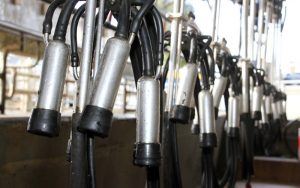
Torrential rain and flooding left some farms completely under water and for dairy farmers busy with calving, it couldn’t have come at a more inconvenient time.
Steve Leov, dairy farmer in the hard-hit Rai Valley area, said he watched three floods sweep through his farm in as many days, but on Monday morning was back in the milking shed.
The water had receded, but fences were covered in debris, mud was everywhere and cows were getting mastitis in the mud and wet.
The Rai Valley does flood but this was unbelievable, he said, with farms there and in Canvastown getting half a year’s rain in just three days.
Leov couldn’t milk for 48 hours, when the milking parlour was totally under water.
Repair equipment was helicoptered in and he was milking again but had no idea when the district would be back to normal.
“We’re not 100 percent operational. Thankfully we’re not supplying yet, because we’re only about a third of the way through calving, so we can milk, which is a big start,” he said.
“Fonterra’s Farm Source has been amazing, they’ve been working really hard. They were working yesterday and on Sunday, delivering stuff to people, what they needed.
“The local school’s been amazing, giving cooked meals, taking the kids yesterday. We’ll get through it, it’s just gonna take work and hopefully everyone gets the support but there will be a lag when people run out of energy and adrenaline, I think.”
He hadn’t yet managed to see a third of his farm because he had been too busy fixing immediate problems.
It is the third time in just over a year a medium-scale adverse event has been announced in Tasman, Nelson and Marlborough.
Tākaka farmer and Federated Farmers vice president Wayne Langford said the damage to roads around the Golden Bay area meant milk tankers couldn’t get in and stock couldn’t get out.
“The trouble has been the roads, we’ve seen a number of slips which are causing trouble, over half of the Bay is shut off from milk collection and livestock transport and that sort of thing, so that’s causing some stress for farmers.
“If we move over to the Nelson, Rai Valley type area, there’s significant on-farm damage there as well as obviously roading and infrastructure.
“It’s a tough time, everyone really been affected in different ways.”
Langford said farmers were able to store milk on-farm for 48 hours and it’s hoped the milk from Monday morning would be picked up by Tuesday night.
He said some farms had borne the brunt of the storm.
“We’ve had one farm that had to evacuate all 500 of its cows and so we’ve been working with Federated Farmers and others to move those animals off their farm and spread them out amongst the farming community.
“We have heard of a few animals that were washed downstream, but fortunately, were actually picked up on farms further downstream.”
Marlborough Federated Farmers vice president Evan White said some farms in the region were completely cut off and without phone service on Sunday night.
“I believe some cows will have to be trucked out of some areas if they’re going to continue milking,” he said.
White said local vets flew in supplies for farmers in the thick of calving this weekend.
He was worried about how some farmers were coping.
“I’m going to put my money where my mouth is, I don’t know if they’re going to milk this season or return to dairying, some of them are in a really bad way.
“They need they need machinery and they they need diggers to rebuild basically, we want to get feed in and stock out.”
The Rural Support Trust is at the ready to help. Chairperson Neil Bateup said it was too soon to know exactly what farmers would need to recover, but they’re able to give support with feed, finances and advice.
The tail end of the wild weather hit parts of Northland as it moved on, giving some farms another drenching of rain after an already wet winter.
Northland farming leader Colin Hannah says the weather prevented some tanker trucks from getting to farms, forcing farmers to dump fresh milk.
“There was a little bit of damage, mainly because of roads being blocked and then the farmers were having to put their milk down the drain, because it couldn’t be picked up.
“I did have a few depressed calls from people saying, ‘Who the eff would be a farmer?’
“Excuse that expression, but you just got the message of where they were at.”
Hannah estimated three days’ worth of milk was dumped at most, but said the ground was still absolutely sodden.
“There are farms still under water. But those farmers, I know most of them, and they’re used to the weather and flooding of their farm, so they plan for it, and so they’re not the ones that are really the most at risk at the moment.
“More at risk is probably those that the feed is getting tight and the ground is so wet, people have been speeding up their rounds just to stop the places turning to mud.
“From this point of view, we’ve never grown so much grass in the winter in our lives, I don’t think. But we can’t utilise it, that’s the frustrating part about it.”
Hannah said the ground was so saturated he had to walk everywhere on his farm, as machinery gets stuck in the mud.
























